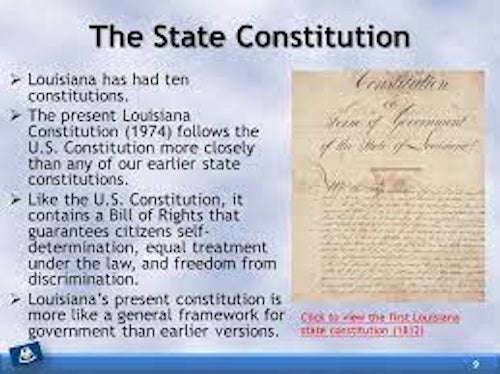Jim Beam column:State had convention in 1992
Published 6:06 am Wednesday, April 10, 2024

- Louisiana's Republican Gov. Jeff Landry wants to hold a two-month constitutional convention this summer. The state's last short convention in 1992 was a failure.(Phooto courtesy of slliddplayer.com).
The proposed eight-week summer constitutional convention backed by Republican Gov. Jeff Landry wouldn’t be the first since the current constitution was approved in 1974. Rep. Beau Beaullieu, R-New Iberia, is sponsor of House Bill 800 that sets up the Landry convention but it hasn’t been heard in committee..
The late-Gov. Edwin W. Edwards supported a limited one month constitutional convention in 1992 that considered amendments to Article VII that deals with revenue and finance. It was a total failure.
Edwards, a Democrat, faced a $1 billion state budget shortfall when he took office for his unprecedented fourth term. He had defeated Republican David Duke, an ex-Klansman, in the Nov. 16, 1991, general election.
The Associated Press reported on Jan. 13, 1992, inauguration day, that Edwards hoped to fulfill a promise not to raise taxes to deal with the deficit. It added that a large number of the 46 new legislators had campaigned on a no-tax platform.
Edwards on Jan. 22, 1992, told members of the Louisiana Assessors Association the state had to change its antiquated tax code to survive. He predicted the Legislature would approve his recommended constitutional convention and voters would elect convention delegates.
Legislators had other ideas and insisted members of the Legislature should serve as delegates, a major mistake. Landry also wants lawmakers to serve as delegates for his proposed convention, along with 27 of his appointees.
The 1992 convention convened on Aug. 23 and had to adjourn on Sept. 22. The state’s voters would decide the fate of the proposed constitutional changes Nov. 3, 1992.
The state’s homestead exemption conceived by Gov. Huey P. Long in 1934 that currently exempts homes valued at $75,000 from property taxation was at risk in 1992 like it could still be this year.
The American Press asked its readers in 1992 if they thought the exemption should be changed and 870 of them (80%) said “no” and 217 said “yes.”
Edwards wasn’t happy after the convention concluded its work. He said the convention might have gotten more done if it had elected delegates instead of legislators who were afraid to “ruffle a few feathers.”
Surprisingly, that convention included an unnumbered constitutional amendment that would allow the governor to trim up to 10% of the then $1.8 billion elementary and secondary education fund in times of a budget crisis.
Lane Grigsby, the Republican mega-donor who headed a Landry transition team, wants to do the same thing today — make it possible to cut the Minimum Foundation Program (MFP) that funds K-12 education. Like other conservatives, he supports school choice that needs state funding.
Despite his criticism, Edwards in 1992 urged the state’s voters to support that major unnumbered amendment to the state constitution. Charles Oakley, who was superintendent of the Calcasieu Parish school system, also had other ideas.
Oakley opposed the unnumbered amendment, saying it authorized up to 10% cuts to all dedicated funds, except those for highways. It would have allowed legislators at that time to cut $180 million in funding for K-12 education.
The unnumbered amendment was rejected by 62% of the voters. The other six were rejected with votes ranging from 54% to 61%.
Edwards said he wasn’t surprised at the defeat of the unnumbered amendment.
“It suggests that the people agree with me — they thought the convention was a meaningless effort,” the governor said.
Mark Drennen, who headed the Public Affairs Research Council at the time, said the unnumbered amendment crammed too much into one proposal.
“To take it all or reject it all — that was more than many of the voters could stomach,” Drennen said.
Observers in 1992 said the voters didn’t like the unnumbered amendment and rejected all of the proposals to be sure the right one lost.
Landry’s proposed constitutional convention faces a similar fate. Rewriting a complete constitution is never a two-month exercise. However, as The Advocate reported Sunday, “ … Landry is moving faster to make change and consolidate power than any governor in decades.”
Landry has made a number of those changes with little public input because he isn’t really interested in what others have to say.
| ReplyReply allForward
Add reaction |





